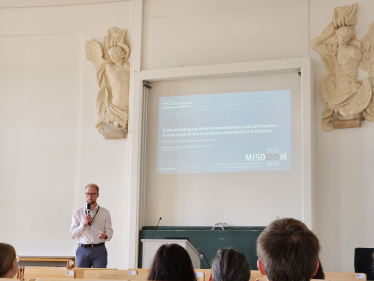Master's students present their paper at the MISDOOM Conference 2024

The 6th Multidisciplinary International Symposium on Mis- and Disinformation in Open Online Media (MISDOOM) was hosted from September 2nd to 4th by the Department of Communication in collaboration with the European Research Center for Information Systems (ERCIS) at the University of Münster. The interdisciplinary conference not only brought together perspectives from communication and computer science, but also provided practitioners from fields such as journalism and fact-checking as well as experts from the private sector a platform for networking.
In diverse panel sessions, speakers and participants were able to discuss various topics related to mis- and disinformation in open online media. In addition to speakers from around the world, two Master’s students had the opportunity to present their first paper at MISDOOM.
The two Master's students are María José González Méndez and Niklas Kloth. María is Colombian and is studying the PIONEER (ERASMUS Mundus Master of Science in Public Sector Innovation and E-Governance) program in her second semester. In this program, she attends a different university in Europe each semester, allowing her to experience a new culture in each country. This experience helps her become a digital native and an expert in the areas of public sector and eGovernment with an international perspective.
Niklas Kloth is in his second semester of the Master’s degree in information systems at the Department of Information Systems. He supports the chairs of Prof. Jörg Becker and Prof. Jan vom Brocke as a student assistant. At Prof. Becker's chair, he works on the eGov Campus project, contributing both conceptually and on the process management course. Niklas Kloth works for Prof. vom Brocke in the area of Process Science and Design Thinking. He has also gained international experience through the ME310 program at Stanford University, in collaboration with TU Vienna and the University of Münster, where he participated in a Design Thinking seminar.
During her research internship at the Department of Information Systems, María José took the initiative to research polarized political communication on X (formerly Twitter) and developed a project to identify indications of polarisation in the case of the Colombian President Gustavo Petro. At the department, she collaborated with Niklas. Their multicultural qualitative evaluation benefited from reducing cultural bias as well as in analysing the results. Throughout the process, the two Master’s students were constantly supported by Michael Koddebusch, Research Assistant at the Chair of Information Systems and Information Management. Their collaborative paper, “Understanding political communication and polarisation: A case study of the Colombian President's X utilization”, was successfully submitted to MISDOOM and accepted as a full paper.
Their paper examines the dynamics of Colombian President Gustavo Petro’s use of X, formerly known as Twitter, focusing on how he employs political communication on the platform and how he uses his posts to polarize. To analyse this, they applied the Framing Theory (based on the framework of Masroor et. al.) to his tweets. The two most active months of tweeting during his first year in office were classified using the framework to analyse how often and on what topics Petro makes use of positive self-presentation and negative other-presentation. The case study by González Méndez and Kloth found that President Petro significantly polarizes through his tweets by using both positive and negative frames. The case study provides valuable insights into the current use of polarizing language on social networks such as X and demonstrates current techniques for creating political divisions using social media as an information system. As such, the paper as whole contributes to the ongoing discussion in the field of political communication studies.
Michale Koddebusch (Research Assistant at the Chair of Information Systems and Information Management) is proud of the project: “I had a lot of fun supporting María’s and Niklas’ research project, and I’m very happy that they managed to get it published in the end. And, of course, it makes me a little proud too.
Links to the news:
The paper can be viewed in full text here.


